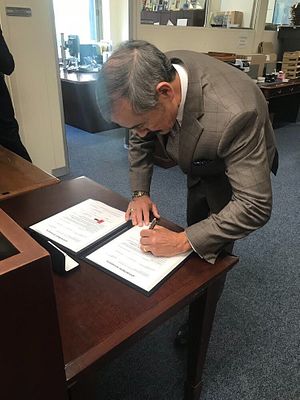After 17 months, the United States will once again have an ambassador in South Korea.
Last week, the U.S. Senate unanimously approved the nomination of retired U.S. Navy Admiral Harry B. Harris Jr. to serve in the role.
Harris will fill a slot vacated by former U.S. Ambassador to South Korea Mark Lippert in January 2017.
Harris, the former head of U.S. Pacific Command, is well-acquainted with South Korea and the U.S.-South Korea alliance.
Before the administration nominated him as ambassador to South Korea, Harris was a candidate to serve as ambassador in Australia. He was formally nominated to serve in South Korea followed U.S. Secretary of State Mike Pompeo’s confirmation in early April.
Harris enters the job at a critical time for the U.S.-South Korea alliance.
Following the June 12 summit meeting in Singapore between North Korean leader Kim Jong Un and Trump, major allied exercises have been indefinitely postponed.
The August 2018 Ulchi-Freedom Guardian exercise has been cancelled and the allies have also postponed two Marine exchange exercises.
In Seoul, Harris will be charged with winning South Korean support for whatever progress the U.S. administration makes with North Korea in upcoming talks.
Pompeo is scheduled to meet his North Korean counterparts on July 6 to see through the implementation of the outcome of the joint statement that came out of the Trump-Kim summit in June.
Harris has been broadly supportive of the administration’s efforts at diplomacy with North Korea even though he adopted a considerably harder tone toward Pyongyang in his previous capacity as the commander of Pacific Command.
Following the summit, we are in a dramatically different place,” Harris had said during his Senate confirmation hearings in June.
“The whole landscape has shifted. I believe we should give exercises, major exercises, a pause to see if Kim Jong Un is in fact serious about his part of the negotiations.”
“I’ve spoken in the past about the need to bring Kim Jong Un to his senses and not to his knees,” Harris added.
He additionally framed the Singapore summit as the start of a longer process with North Korea.
The summit process was meant “to establish the modalities for what a complete verifiable irreversible denuclearization means and how we’re going to go about that.”

































